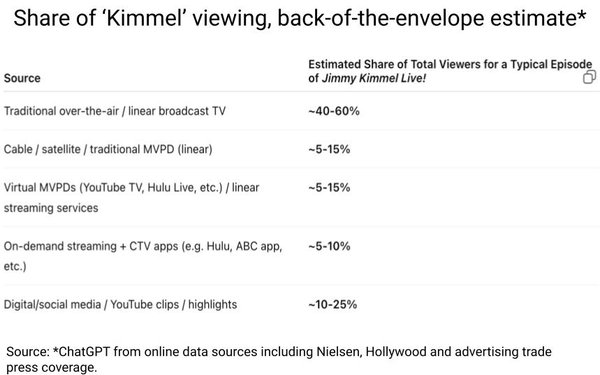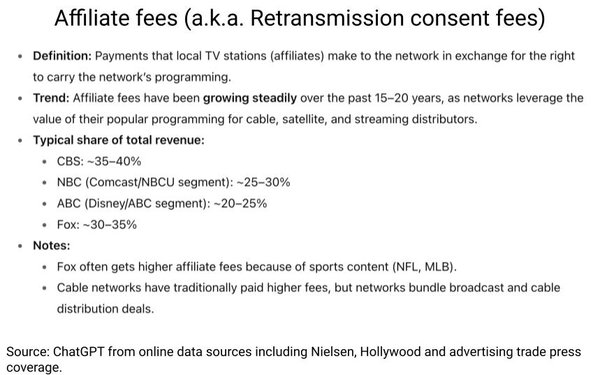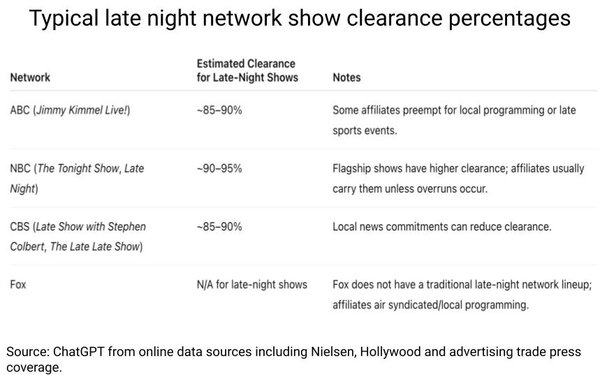
"We are broadcasting to about 75% of the country from Los
Angeles tonight," Jimmy Kimmel said when opening his monologue Thursday night. Technically, he was correct in terms of "broadcasting," but in the modern era of media content distribution he was
misrepresenting the show's distribution reach -- which technically is global, if you include YouTube. Or in terms of actual viewers, about one third of the planet's population.
Back in the
U.S., about 93% of the American population can access and watch content -- including the opening monologue from Thursday night's "Jimmy Kimmel Live!" (see below) -- via YouTube alone.
And
while I know these stats probably don't surprise you, I think they are worth revisiting in light of what happened with Kimmel's ABC-distributed show since Disney's ABC network pulled the show on
September 17 and subsequently brought it back to some of its highest ratings -- and YouTube views.
advertisement
advertisement
I'm bringing this up now because of Kimmel's point that Thursday night's episode was NOT
broadcast to 25% of the country, because some affiliates -- principally Nexstar and Sinclair stations -- are preempting it.
From a television industry business-case perspective, it will be
interesting to see how that relationship plays out.
And it certainly won't be the first -- or last -- time that networks and their affiliates disagree on carriage of specific programming,
especially in late night and other dayparts.
While prime-time network TV shows average upwards of 99% affiliate station clearances, even prime-time shows get bumped occasionally -- often for
content controversy reasons that station owners object to.
As someone who covered the height of the network/affiliate distribution system in the 1980s, I can recall a number of high-profile
instances when that happened.
Usually, they were ABC shows that were edgy and pushed the envelope of broadcast TV standards, including controversial made-for-TV movies like "Something About Amelia" and "The Day After," but even some of the network's
boldest scripted, prime-time dramas faced affiliate preemptions, including "NYPD Blue," because of their edginess.
And while those
affiliate preempted controversial shows were not inherently bumped for political reasons, we are now living in an era of media content -- as well as much of everything else -- that is inherently
political.
Since this is a "TV Blog" fill-in column, and not a "Red, White & Blog," I won't go into the reasons why that is, but I will say it does have something to do with media --
especially what certain big TV station groups (insert Nexstar, Sinclair, or whichever you want here), and at least one notorious cable TV network.
But the point of today's column is about the
continuously deteriorating relationship between affiliates and networks regarding the carriage of programming, as well as some other business model issues.
I bring this up now not just because
of the Kimmel shenanigans, but because it has always been a big discussion point, and because that started to change along with broader video content distribution models with the rise of the
internet.
In fact, I recall (although I can't find any of my ancient analog clips to cite it specifically, and good luck finding them online), that it was ABC that first began making veiled
threats of bypassing affiliates altogether and going direct to viewers if affiliates didn't get more in line.
I recall the term "internet bypass television" being bantered about, which morphed
into what we sometimes now refer to as "OTT," or over-the-top television.
Add in CTV, streaming and a variety of other internet-enabled distribution methods -- including YouTube, social media
clips, etc. -- and I think the threat of bypassing affiliates and going direct-to-viewers is more realistic now than ever before. And I would argue, it will increasingly be the model for distributing
what we used to call "broadcast network television" in the future.
Certainly, this is not new, and we routinely see examples of network-produced shows going straight to streaming platforms. Or
in the recent case of Peacock's "The Paper," which will begin airing on NBC in November, it even goes the other way around.
The biggest reason why networks like ABC haven't pulled the
affiliate plug yet probably has less to do with the ability to reach -- and/or monetize -- viewers.
It's because of a case of business model inertia: The networks still derive a big chunk of
their total revenues from so-called affiliate fees that stations pay them to distribute their shows, which are not insignificant to their bottom lines, accounting for about a third of their total
network TV revenues.
Interestingly, ABC derives the smallest share of revenue from affiliate fees -- between 20% and 25% -- of any of the major networks, so it is least vulnerable and in the
best position to pull the affiliate plug altogether.
I'm not saying it should, but it could.

Meanwhile, the shift in internet-enabled content distribution models raises a question not
just for television networks, but for their talent, some of whom -- ie., late night TV show hosts -- are becoming casualties of the whims of politically charged -- and in Kimmel's and Stephen
Colbert's cases -- heavy-handed regulatory tipping of the scales.
So the bigger question may not be how the network/affiliate business model evolves during this period of increasing
instability, but what business model their talent decides to lean into.
If we're talking about "late night talk show" hosts, I do think there is some substance to the meaning of that genre
that would make them want to continue "broadcasting" that way, even if it's to only 75% -- or whatever -- of the country. That's because the network/affiliate model is part of the fabric of the genre
itself, bringing those late-night monologues into American homes via their "electronic hearths."
But as someone who was sitting in the audience when Johnny Carson announced to a roomful of
advertisers and affiliates at Carnegie Hall that he was pulling his own plug, nothing lasts forever.
I'm thinking more about Colbert right now because he actually got his plug pulled, and
while he is using his remaining broadcast network days doing what he does best, I think he could be the big canary in the network/affiliate coal mine, if he chooses to go direct-to-viewers.
I
mean, why not?
For what it's worth, the last question I asked ChatGPT with regard to this column was how much is direct-to-YouTube star MrBeast (James Stephan Donaldson) worth:
"As of 2025, Jimmy Donaldson, widely known as MrBeast, has an estimated net worth of $1 billion,
making him the youngest self-made billionaire in the world at age 27. This milestone was confirmed through various sources, including court documents and financial reports."
